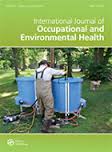 After the editorial board of a public health journal resigned in protest last week, the publisher is trying to “move on.”
After the editorial board of a public health journal resigned in protest last week, the publisher is trying to “move on.”
In a statement from Taylor & Francis, the publisher laments that the board of the International Journal of Occupational and Environmental Health “did not wish to take the opportunities offered by ourselves and the editor-in-chief to discuss the journal’s future,” and defended its recent editorial decisions that were questioned by the board.
Since the the spring, the board has vocally protested actions taken by the journal without consulting the editorial board, including its decision to appoint a new editor with industry ties, and the “unilateral withdraw[al]” of a paper by the previous editor that was critical of corporate-sponsored research, with little explanation. In the resignation letter from last week, the board said it did not wish to participate in the “apparent new direction that the journal appears to be moving towards.”
In its statement, the publisher says it has no plans to make “major changes” to the journal:
There is currently a pipeline of submissions, which the editor-in-chief is working through. As these papers are published, their quality will attest to the rigour of the peer review process that is being put in place, and their content will indicate the scope and direction of the journal. As has been explained in previous correspondence with the former editorial board, there is no intention to make any major changes to the journal’s mission or scope. The same types of scientific articles should continue to find a home in the journal. The focus will be on presenting original science and educating on current issues in science, with a balanced approach which will also allow the publication of alternative perspectives and diverse views.
The publisher also once again defended its decision to withdraw a 2016 paper by former editor David Egilman:
At no point has Taylor & Francis ‘unilaterally retracted’ any paper from this journal. One paper, “The production of corporate research to manufacture doubt about the health hazards of products: an overview of the Exponent BakeliteTM simulation study” by Dr D.S. Egilman was withdrawn because it was published inadvertently, before the review process had been completed. On completing that review, it was decided the article was unsuitable for publication in the journal.
The publisher also said it’s trying to look forward:
We are disappointed to be parting company with the editorial board of International Journal of Occupational and Environmental Health and regret that they did not wish to take the opportunities offered by ourselves and the editor-in-chief to discuss the journal’s future. We wish them well and would like to thank them for their work on the journal to date.
Our focus now is to move on and support the editor-in-chief in his work on the journal. This includes the appointment of a new editorial board, though both ourselves and the editor-in-chief would be happy to discuss membership with any of the original board at any time, now or in the future.
“They should know better”
Former board member Barry Castleman, an environmental consultant who signed an April letter to the publisher, told us:
T&F continues to refuse to provide information on how and why T&F, a private publishing company, took it upon itself to withdraw a paper that was peer reviewed, accepted, and published in IJOEH, a scientific journal.
Castleman added that, according to ProPublica, consultant Dennis Paustenbach — whose work was mentioned in Egilman’s withdrawn paper — asked the journal to retract Egilman’s paper:
Neither Editor-in-Chief and no one on the Editorial Board was involved in the review process which ensued. T&F refuses to describe that process to the editors, to COPE, or the media. But it’s clearly not proper for a party unhappy with a scientific journal article to be able to get the publishing company to totally, unilaterally, withdraw the paper without any public explanation whatsoever. Is this the “balanced approach” T&F intends for IJOEH to pursue?
The fact that they publish so many other journals shows that they should know better than to think this is proper or normal.
Like Retraction Watch? Consider making a tax-deductible contribution to support our growth. You can also follow us on Twitter, like us on Facebook, add us to your RSS reader, sign up on our homepage for an email every time there’s a new post, or subscribe to our daily digest. Click here to review our Comments Policy. For a sneak peek at what we’re working on, click here. If you have comments or feedback, you can reach us at [email protected].
“did not wish to take the opportunities offered by ourselves and the editor-in-chief to discuss the journal’s future,” Ugh. Some basic grammar would help. “ourselves” should be “us”.